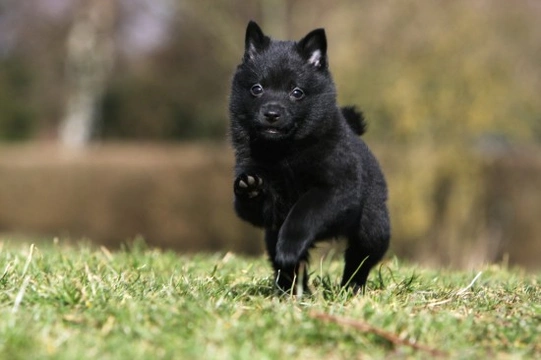
Is a Schipperke the right dog for you?
The Schipperke is a small breed of dog with a black coat, which originated in Belgium, and is thought to have been around in near to its current form since the 16th century. There is quite some debate regarding the breed classification of the Schipperke, and whether it should be correctly classed as a spitz type dog, or a sheepdog, as the dog has a significant number of traits for both groupings. However, in its home country of Belgium, the Schipperke is classed as a small shepherd-type dog.
The Schipperke is relatively unusual within the UK but very distinctive, with an all-black double coat and small, pointy ears, plus a tail that is often curled over in the spitz style.
They also have a thick ruffle of fur around their necks, and longer hair on their hind limbs, which are known as culottes. While black is by far the most common colour for the breed, they can occasionally be seen in a blonde colouration too. They are relatively small, weighing between 3-9kg, and standing around 13” tall, with males being larger than females.
They are lively, full of beans and have a strong prey drive, as well as being known for being mischievous, headstrong and sometimes stubborn! They do have a tendency to find their own entertainment if bored, and also have a propensity to chase smaller animals. The Schipperke is also sometimes referred to as the Tasmanian black devil, or the little black fox, due to their unique appearance.
If you are wondering if a Schipperke might be the right choice of pet for you, in this article we will look at the temperament and traits of the breed in more detail, plus some of the pros and cons of their ownership. Read on to learn more.
The Schipperke temperament and traits
The Schipperke has a high prey drive and lots of energy, and so requires a reasonably high degree of both entertainment and supervision to keep them from getting into trouble! They are intelligent and active, and so need plenty of mental stimulation and exercise, and do not like having nothing to do. They are also renowned for being rather wilful and stubborn, and so require an experienced trainer who is able to stay one step ahead of them and address their more difficult traits successfully!
They are also fairly noisy, and are not shy to bark. Good socialisation with other dogs from an early age is vital, as failing this they can become aggressive and difficult with other dogs. While they can live in a small home, being a small dog, bear in mind that they are lively and active, and require plenty of safe, supervised access to the outdoors.
Providing that they have an experienced, knowledgeable owner who can manage the potential challenges that the breed presents, they are good all round dogs, who can turn their paws to many skills and often, excel at canine agility.
They shed their fur in moderate quantities throughout the year and do need regular brushing and grooming to keep their double coated fur in good condition, but simple brushing usually takes care of this, and looking after the coat is not generally hugely time consuming or expensive. Added to this, the Schipperke will blow their coat a couple of times a year, a typical spitz dog trait, which means that they will shed all of their thick undercoat over the course of a couple of weeks, which can result in lots of fur being shed all over the house, and the need for a lot of daily grooming and tidying up!
The Schipperke might be the right dog for you if:
- You are experienced in training and managing dogs, including lively, intelligent breeds!
- You like the unusual look of the Schipperke, and their spitz dog traits and rather fox-like appearance.
- Want to own a challenging, intelligent and active breed of dog.
- Can manage a dog with a strong prey drive effectively.
- Are looking for a superior watch dog.
- Wish to own a pedigree dog that is hardy and not prone to a wide range of health problems.
The Schipperke will not be the right dog for you if:
- You are looking for a quiet, sedentary dog that is not hugely active or energetic.
- You have to leave your dog alone a lot of the time.
- You cannot manage wariness of strangers and strange dogs effectively.
- You do not have a safe, enclosed garden for the dog to use.
- You do not fully understand the canine prey drive and know how to control and manage it.
- You are not confident in your abilities to train a challenging dog.
- You wish to own a dog that is not prone to barking.
- You are not willing to groom the coat, and deal with a blown coat several times a year.



